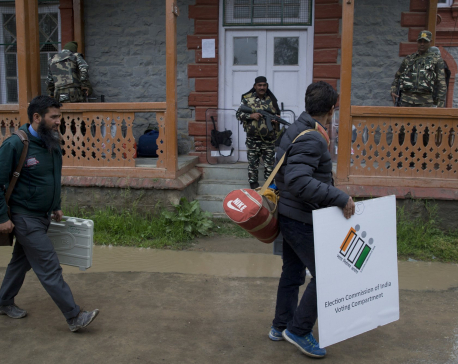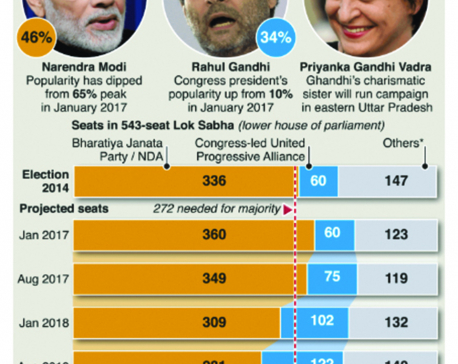
OR
Gandhi scion comes into his own as India polls near finish
Published On: May 8, 2019 10:00 AM NPT By: Associated Press

NEW DELHI, May 8: With India’s general election inching toward the finish line, the battle for one seat in the northern state of Uttar Pradesh is being closely watched to see whether the scion of the country’s most important modern political dynasty can retain his seat and revive his party’s fortunes.
After 15 years in politics, Rahul Gandhi is beginning to articulate a vision for India that some observers say is making him a more credible leader. But it’s unclear whether Gandhi, who is president of the opposition Congress party, has rallied enough support in time to defeat Prime Minister Narendra Modi.
Gandhi, 48, has often been the object of derision from political rivals, who accuse him, despite his pedigree, of being a lightweight. In contrast to Modi, a tea seller’s son who went on to become India’s leader, Gandhi inherited his power, making him an easy target of charges of nepotism and dynasty politics.
For years, Modi and other leaders of his Bharatiya Janata Party have referred to Gandhi as the “shehzada,” or prince. Critics accuse him of being aloof, a cosmopolitan elite detached from the harsh realities of India’s legions of rural poor.
After the Congress party’s hold in Parliament collapsed from 206 of 543 seats to a mere 44 seats in 2014 elections, Gandhi’s political obituary was all but written.
But with small businesses and farmers hurt by some of Modi’s signature policies, and mob attacks on Muslims on the rise, Gandhi and the inclusive, secular politics the Congress party has long represented are starting to resonate.
Gandhi is seeking re-election for a fourth consecutive time in the Uttar Pradesh town of Amethi. The general election, which is being held in seven phases, ends May 19, and vote counting begins May 23.
“In finding his feet in politics, Gandhi has become a perfect foil for Modi,” said political commentator Seema Mustafa. “He comes through as humble, democratic and responsive, and plays on love, peace and humanity as against hate and aggression. The smile against the wagging finger, the embrace against the threat — it is all now part of a persona, natural and yet crafted.”
If Gandhi came across as a reluctant politician, the reasons are not hard to find. His family, starting with his great-grandfather, Jawaharlal Nehru, has produced three prime ministers. Two of them — his grandmother Indira Gandhi and father, Rajiv Gandhi — were assassinated in office.
“In my life, I have seen my grandmother die, I have seen my father die, I have seen my grandmother go to jail, and I have actually been through a tremendous amount of a pain as a child,” Gandhi said in a 2014 interview with an Indian TV channel.
Even after becoming a lawmaker, he distanced himself from political life, refusing to even call himself a candidate for prime minister. In 2014, he was re-elected in Amethi, considered a Gandhi bastion, by only a thin margin.
Yet, under relentless public scrutiny, Gandhi has honed his public speaking and leadership skills. He now comes across as more confident, forceful and credible, according to political analysts. And he is also starting to come across as a vigorous and even pugnacious campaigner.
In Parliament, where he’s represented Amethi since 2004, he had been a backbencher, leaving the party reins largely to his mother, Sonia Gandhi.
But he’s started to hit back. One recent barb in particular struck home — he taunted Modi for wearing a monogrammed suit worth $14,400, saying that Modi’s “suit-boot” government was only for the rich.
Perhaps most important, Gandhi has shown he has the stomach for a fight, even challenging Modi, a much more experienced politician, to a public debate. Modi has ignored the challenge.
Gandhi’s biggest political triumph in 15 years was easily Congress’ win in assembly elections in December, wrangling power away from Modi’s BJP in the states of Rajasthan, Madya Pradesh and Chhattisgarh.
Suddenly, the BJPs’ preferred Gandhi jibe — “pappu,” Hindi for greenhorn — began to fall flat.
Suhsmita Dave, head of the Congress party’s women’s wing, said she has known Gandhi well for a decade and he’s basically the same man. The only difference, she said, is that earlier, he held back out of respect for protocol, letting his mother run the party and Manmohan Singh lead the Congress-controlled government.
“He let them get on with their jobs. This gave the BJP a chance to paint him as a reluctant politician,” Dave said. “But the truth is that he was never a leader in a hurry. He waited his turn. When it came, he took the bull by the horns and has been vocal and aggressive. There is no point firing your gun until the time is right.”
Still, critics say there’s a long way to go.
Gandhi brought his sister, Priyanka Gandhi Vadra, into the party, appointing her to oversee a post in the eastern part of Uttar Pradesh that includes Varanasi, the Hindu holy city where Modi is up for re-election as a member of Parliament. Her popularity has drawn huge crowds to campaign events, but it may not be enough to counter her brother’s perceived sluggishness.
Gandhi has been criticized for his low attendance in the last Parliament, showing up just over half the time; for being abroad at critical moments; for describing power as “poison”; for not cultivating a younger generation of Congress leaders; and for failing to fulfill a promise to overhaul his party’s hierarchy.
He also was unable to forge an alliance with two important opposition parties in vote-rich Uttar Pradesh to wrest power away from the BJP in the current election. In New Delhi, too, he was unable to tie up with the ruling party to combat the BJP.
Whatever the result of the election, Gandhi is now seen as a feisty opponent, most recently in an interview with the daily Indian Express newspaper.
“That destruction of the idea of an invincible Mr. Modi, that destruction of the lie of Mr. Modi, is primarily the work of the Congress party,” he said.
You May Like This

May 12: 6 things to know by 6 PM today
Your daily dose of missed important news of the day. ... Read More...

2nd phase of voting begins in India’s general election
SRINAGAR, April 18: Voting began in the second phase of India’s general elections Thursday amid massive security and a lockdown... Read More...

Infographics: India poll suggests a hung parliament
Indian Prime Minister Narendra Modi’s ruling BJP-led National Democratic Alliance (NDA) will fall short of a majority in parliament after... Read More...





Just In
- CM Kandel requests Finance Minister Pun to put Karnali province in priority in upcoming budget
- Australia reduces TR visa age limit and duration as it implements stricter regulations for foreign students
- Govt aims to surpass Rs 10 trillion GDP mark in next five years
- Govt appoints 77 Liaison Officers for mountain climbing management for spring season
- EC decides to permit public vehicles to operate freely on day of by-election
- Fugitive arrested after 26 years
- Indian Potash Ltd secures contract to bring 30,000 tons of urea within 107 days
- CAN adds four players to squad for T20 series against West Indies 'A'













Leave A Comment